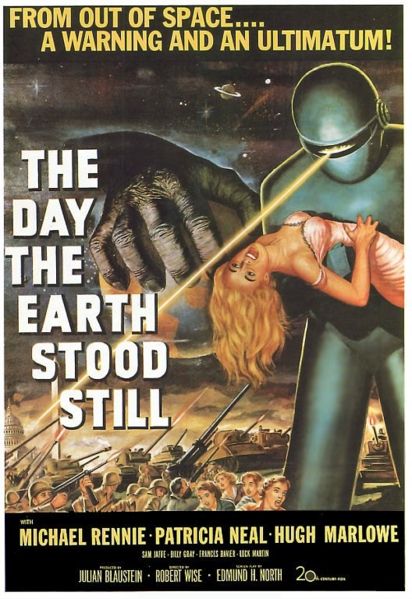
|
The special effects in “The Day the Earth Stood Still” may have wowed audiences of the time, but the film continues to inspire today because of the concepts it involves. A brilliant being from a distant world, Klaatu, similar to humans, but vastly more advanced must deliver a crucial message to the world, but Cold War era fear and suspicion are working to thwart him.
The film was geared toward 14 year old children, and proof that this movie captured the hearts and imaginations of this age group in its day is found in all the inside-joke references writers and directors make to it today. Steven Spielburg has the film playing on a television in his film “E.T.,” which bares similarities in theme and structure. The films “Toys” and director Sam Raimi’s “Army of Darkness” both quote the famous alien command “Klaatu Barada Nikto,” used to control the sentinel robot Gort. Even George Lucas named three aliens playing in the cantina band of his film “Star Wars” after these words.
In writing there is the concept of “show don’t tell.” The same principle applies to filmmaking. Audiences recognize Klaatu as a superior being despite his unassuming nature. Statements he makes, the actions he takes, everything about him is reserved and collected. He is a walking understatement, and, beyond one incredibly dramatic demonstration, we are only given hints at the many other incredible powers he must keep in check.
Klatu presents an ideal, an attainable ideal, to the audience. He represents what the human race may aspire to through science, reason, and technology. He defeats the angry and the fearful with a calm collectedness. There is no harm the parochial humans can inflict upon him that he cannot overcome.
At the same time, Klaatu does not look down upon the human race, but recognizes its accomplishments along with its faults, which are seen more as behaviors we will eventually grow out of. He tours the mall in Washington DC, recognizing Abraham Lincoln as a great individual. He approves of and indulges young Bobby’s curiosity about his spacecraft, even though a bystander mocks his explanations.
“The Day the Earth Stood Still” falls into that category of futurist storytelling that is hopeful for the future and intellectual in its approach to the conflict. Similar to “Star Trek” or “The Uplift Saga,” the film’s protagonist’s strongest virtues are his reason and his humanity. The film’s message has secular humanist origins, and is one of human improvability, emphasizing the need for cognitive mastery over our irrational emotional reactions.
Spoiler Warning!
I love the fact that Klaatu shuns the established authority and instead seeks the help of of a well-known scientist. The “calling card” he leaves for the Doctor is ingenius, a hint to solve a complex equation the Doctor is working on. Klaatu wants to deliver his message to people with similar ideals, not those concerned with power and control, but those serving a higher purpose.
The crowd assembled at the film’s conclusion, brought together at Klaatu’s request, is not composed of world leaders, dignitaries, or ambassadors, but of scientists. They are the closest things Klatu has to peers on our tiny planet. The film strikes another chord of secular humanism in this respect, a faith in scientific principles over established paradigms of the time.
Klaatu Barada Nikto!